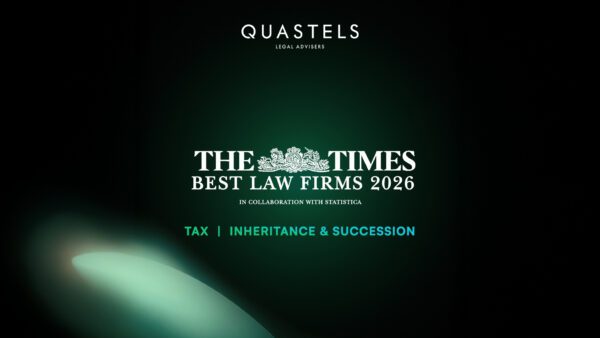Latest Posts

The Digital Markets, Competition and Consumers Act 2024: What Your Business Needs to Know
The Digital Markets, Competition and Consumers Act 2024 (“DMCC ACT“) is widely regarded as the most significant overhaul of UK consumer protection and competition law since the Consumer Rights Act 2015. The DMCC Act introduces wide-ranging reforms to digital markets, competition enforcement and consumer protection. Although the Competition and Markets Authority (“CMA“) has suggested it will offer businesses some initial breathing room to adjust to the changes, organisations need to understand how the rules are changing and where they may need to proactively adapt.
What does the DMCC Act do?
While the DMCC Act contains a number of key pillars of reform, the one that is likely to be key for most businesses is the reform to consumer protection. The DMCC Act introduces stronger enforcement powers for the CMA, including direct penalties and new rules around unfair commercial practices, hidden fees (drip pricing), fake reviews and subscription traps. These changes are consumer-facing and are where businesses of all sizes are most likely to feel immediate impact.
CMA’s Direct Enforcement Powers
For the first time, the CMA can investigate and penalise consumer law breaches through administrative proceedings, bringing consumer protection enforcement into closer alignment with its existing competition law powers. It can now impose substantial financial penalties without going through the courts, including up to 10% of global annual turnover (or £300,000, whichever is greater) for consumer protection breaches. These penalties are split into categories reflecting different types of infringement, ranging from procedural or investigatory failures to non-compliance with CMA directions. These powers apply to a broad range of existing consumer protection legislation, much of which has now been consolidated in the DMCC Act.
Although there is no formal statutory grace period, the CMA has indicated it will focus initially on more serious breaches. Businesses must therefore treat compliance as a priority, rather than a simple operational tick-box exercise.
New Consumer Protection Requirements
The new consumer protections that businesses must address include:
Drip Pricing
All pricing information must now display the total upfront cost in adverts and product listings, including any booking fees, taxes, delivery charges or other payments that the consumer will incur. If there are charges that cannot reasonably be calculated in advance these can be excluded from the headline price but nonetheless must be clearly disclosed. Hidden mandatory fees are a key risk area that the CMA is actively policing.
The CMA’s guidance gives the example that if a gym membership is subject to a minimum contract term of six months, then the advertised price must set out the total six-month cost, not just the monthly fee.
Fake Reviews
Publishing or facilitating fake or misleading reviews is banned. Crucially, the DMCC places a positive obligation on traders to take “reasonable and proportionate steps” to prevent fake reviews from appearing on their platforms.
Businesses that use the online platforms or digital marketing will need to implement checks on reviews alongside clear terms of engagement in order to demonstrate it is actively preventing and removing fake reviews.
The CMA permitted a 3-month adjustment period to enable businesses to digest the guidance, which concluded earlier this month, and since then it has completed a website review of more than 100 businesses including Viagogo, StubHub, AA Driving School and Wayfair. It found that more than half of the businesses investigated may be failing to comply with the guidance.
Subscription Contracts
Rules about consumer subscriptions were due to come into force in Spring 2026, but it is expected that this may be pushed back by a further 6 months. Once in place, businesses offering subscription services will face additional requirements designed to combat “subscription traps”. These include:
- providing clear information about pricing, auto-renewals, and cancellation methods after trial periods before consumers enter contracts;
- issuing reminders before free or discounted trials end; and
- ensuring clear and straightforward cancellation procedures and renewal terms.
The obligations will become implied terms of consumer contracts and will give consumers additional cancellation rights if traders fail to comply.
Implications for Businesses
Consumer-facing business models are under new and heightened scrutiny, particularly where online platforms, digital marketing, subscriptions or renewal models are used. Consumer protection has been elevated, therefore businesses must ensure their terms of sale (including terms covering subscription/cancellation/refunds) comply with the new rules.
In relation to M&A, the enhanced review powers coupled with greater willingness from the CMA to intervene, mean that businesses engaging in M&A must consider the broader digital market context when carrying out its due diligence exercise.
Although the CMA has indicated it will initially focus on and prioritise more egregious breaches, it is clear that it intends to act swiftly and stop unlawful conduct. The CMA may also consider previous conduct when setting monetary penalties, especially where the business has been non-compliant with CMA enforcement in the past.
How Can Businesses Prepare?
- Conduct an audit – look at your business’s digital activities, consumer facing interfaces and subscription or renewal models. Review and update contracts, terms and conditions, cancellation processes and pricing structures to reflect clearer transparency and comply with the new rules on hidden fees;
- For online platforms, implement review controls and detection methods for fake reviews, and consider documenting these procedures to demonstrate active compliance;
- Prepare for the new subscription rules – if your business offers subscriptions, begin preparing now ahead of the new subscription requirements to ensure a smooth implementation;
- For M&A deals, incorporate DMCC Act checklists into the due diligence exercise and consider broader competition law implications; and
- Monitor upcoming guidance and secondary legislation – the CMA has published, and is continuing to publish, helpful guidance materials so that businesses can prepare. Many rules are still in the process of being rolled out so now is the time to seek clarification if anything is unclear.
Conclusion
The DMCC Act represents a fundamental change in the UK’s consumer law and digital markets landscape. The CMA now has the power and the resources to take swift and decisive action against businesses that fall short of their consumer law obligations.
For businesses, this shift brings greater penalties for non-compliance but also greater rewards for transparency and fair dealing. Organisations operating in the UK market should act now to review existing practices and strengthen internal governance. The regulatory environment is changing, and businesses that adapt now will be far better placed to grow and build consumer trust in this new era.
Read More
Transfer of Equity to a Family Member: Costs, Tax and the UK Process
This is a legal process where the ownership of a property is changed by one or more people being added or removed from the property title.
The common reasons people choose a Transfer of Equity:
- Marriage or Civil Partnership: adding a spouse or partner to the title.
- Divorce or break-up: removing a former partner from the title.
- Buying out a Co-Owner: one owner purchasing the other owner’s shares.
- Gifting property to a relative.
- Creating a more favourable tax position for the family.
Can we use the same solicitor, or does each person need their own solicitor?
It depends on the circumstances. Your solicitor will be able to answer this once they have all relevant information of the proposed transfer.
Are there any Tax implications on transferring your property?
- Stamp Duty Land Tax (‘SDLT’) may be payable if the transfer is for any payment, or if a mortgage debt is being repaid or remaining on the title.
- If you want to transfer your property as a gift, you may be liable for capital gains tax and there will be inheritance tax consideration.
Quastels’ Private Wealth team can assist with any tax queries involving transfers of equity and wider tax planning considerations.
What is the process?
- If the property is mortgaged, first speak to your mortgage lender as their consent may be required for the transfer.
- Take tax advice and appoint a solicitor. At Quastels, we can advise on the tax position as well as deal with the conveyancing (the conveyancing costs will be lower than a normal purchase).
- If the property is leasehold, a ‘licence to assign’ may be required, which is the landlord’s consent to the transfer. Your solicitor will check the lease to see if this is required and if so, will obtain it as part of the process.
- All parties to the transfer will need to sign a Transfer Deed with an independent witness.
- Once all above points have been satisfied, completion can take place and your solicitor will deal with any necessary payments.
- Depending on the circumstances, SDLT may be payable and your solicitor will lodge the SDLT return.
- If Leasehold, your solicitor will serve notice of the transfer upon the managing agents to ensure they update their records.
- As the final part of the process, your solicitor will send an application to H.M. Land Registry to update the property ownership details.
To discuss a Transfer of Equity, contact our Residential Real Estate team, and our Private Wealth & Tax team.
Read More
Quastels Recognised in The Times Best Law Firms 2026
Quastels LLP has debuted in The Times Best Law Firms 2026. Listed in two categories, our Private Wealth & Tax team make their entry into their third directory of the year, alongside The Legal 500, and Spear’s 500.
About The Times Best Law Firms
The Times Best Law Firms lists the top 250 legal practices in England and Wales. Independently collected by Statistica, all listed practices are chosen by lawyers through peer nomination. We would like to extend our gratitude to our peers who nominated us.
Recognition
Quastels has been recognised in particular for ‘Inheritance & Succession’ and ‘Tax’. Our Private Wealth & Tax team were noted for their strength in core practice areas, as well as emerging fields such as digital assets and cryptocurrencies. In the ‘Tax’ category, Quastels was one of only nine firms commended. Led by Partner Ben Rosen, the team comprises of Senior Associate Jack Burroughs, Solicitors Eleanor Catling and Alice Lumley, and Paralegal Jemima Plowden Roberts. This dynamic team are known for their personal approach and forward-thinking strategies.
Get in touch with our Private Wealth & Tax team for information on how they can assist you.
Read More